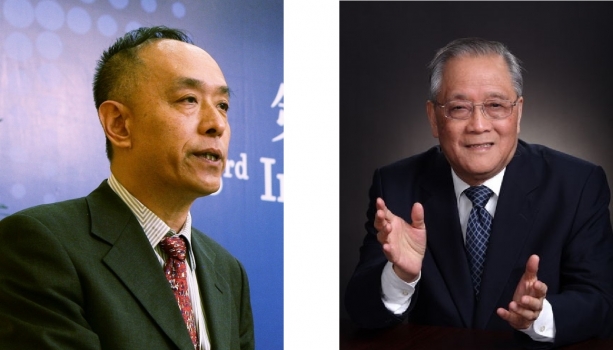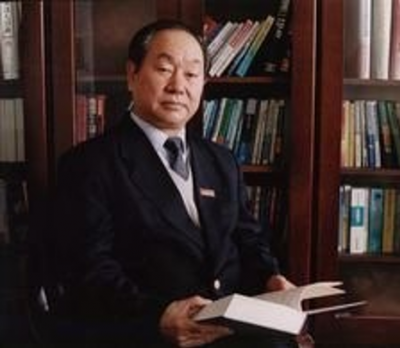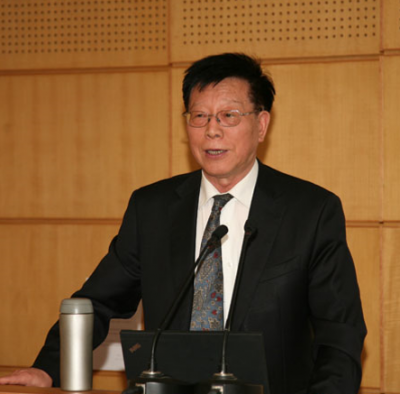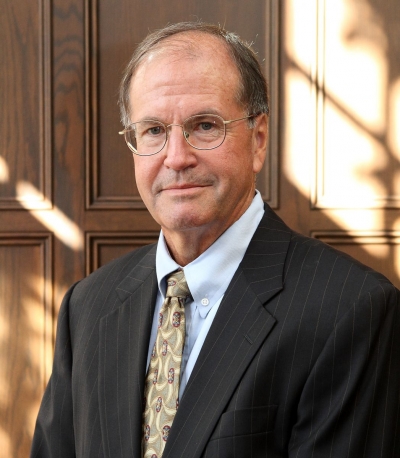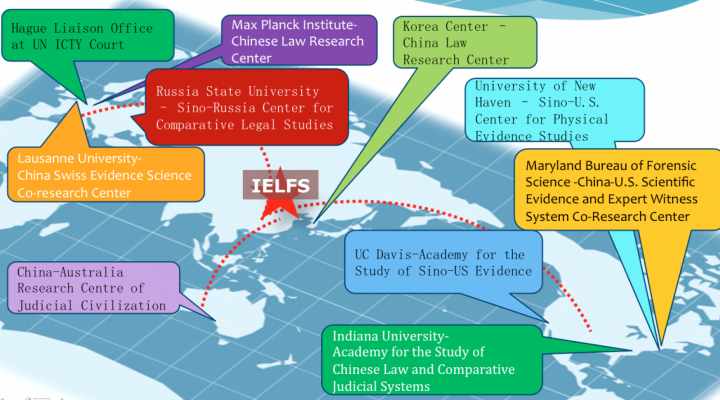- reads
- 简体中文

The Institute of Evidence Law and Forensic Science ("IELFS") of China University of Political Science and Law ("CUPL") was founded on May 20th, 2006. In December 2005, the PRC Ministry of Education approved establishment of “Key Laboratory of Evidence Science (CUPL), MOE, China”. In 2007, filed with the State Council of China, CUPL set up doctoral and master degrees on evidence law (the second-level of law degree) with two directions: evidence law and forensic science. In 2009, MOE approved the “Evidence Science Team of Research and Application Innovation” to be selected into MOE Yangtze Scholar and Innovation Team Development Plan. In 2010, the Political and Judiciary Commission of CCP approved Fada Institute of Forensic Medicine & Science to be selected as one of the ten national judicial appraisal institutions in China. Neither the past pains of childbirth or the ongoing growing pains or joys of success can stop us passing the flame from generation to generation, to embrace the greater prosperity. Because our immutable fate carries virtues coherent with the sky and the earth, as bright as the sun and the moon, together with the circulating four seasons, guiding us to keep exploring evidence science, promoting the judicial civilization and building up the cornerstones of the rule of law in China. In the meanwhile, IELFS is one of the key components of the “2011 Plan” of China – Collaborative Innovation Center of Judicial Civilization (“CICJC”) of the MOE and the Ministry of Finance ("MOF") and serves as the secretariat of the International Association of Evidence Science (“IAES”). IELFS also holds the “111 Plan” of China – Evidence Science Innovation and Talent Base (“ESITB”) which is jointly implemented by MOE and the State Administration of Foreign Experts Affairs (“SAFEA”), an interdisciplinary key discipline of evidence science in Beijing, a team for MOE evidence science research and application innovation. In 2019, as the first batch, Evidence Science was selected into the development list of top advanced disciplines in Beijing universities.
Our motto is “Identify the Authenticity of Evidence; Cast the Cornerstone of Rule of Law”. Our advantage and feature are cross-disciplinary studies between social science and natural science, and doing teaching, research and practice altogether. Evidence law, forensic medicine and material evidence technology are the three main directions of research of our institution. Cross and synthetic studies on natural science and social science are our feature. We work on important theoretical issues of evidence science, frontiers in science and technologies, as well as major national needs. And our main research goal is to obtain original innovation results and independent intellectual property rights.
Our Mission ----
Keep exploring evidence science, promoting the judicial civilization and building up the cornerstones of the rule of law.
History
Establishment of the Institute of Evidence Law and Forensic Science of China University of Political Science and Law is the triune outcome of good timing, right place together with great human relations.
– Professor Baosheng Zhang
On May 20th 2006, the Institute of Evidence Law and Forensic Science of China University of Political Science and Law was formally established.
Good Timing: In February 2005, "The Decision of the Standing Committee of the National People's Congress on the Administration of Judicial Forensic Examinations" was formally promulgated, separating forensic examination institutions from the people's courts, which promoted the successful collaboration between China University of Political Science and Law and the forensic expert team formerly belonging to the Beijing Higher People's Court.
Right Place: In December 2005, the PRC Ministry of Education for the first time started constructing cross-disciplinary key laboratories in selected liberal arts colleges and universities in China and ratified the Key Laboratory of Evidence Science("KLES") of Ministry of Education at CUPL as one of the two approved national "first batch" cross-disciplinary key laboratories.
Great Human Relations: The first is the collaboration between China University of Political Science and Law and Beijing Higher People's Court. The second is the combination of disciplines of evidence law and forensic science.
Our Motto: Identify the Authenticity of Evidence; Cast the Cornerstone of Rule of Law.
Leadership
Both of Professor Baosheng Zhang and Professor Guangzhong Chen are the Honorable Dean of IELFS.
Professor Chongyi Fan is the Honorable Director of KLES.
Professor Yao Liu, a member of the Chinese Academy of Engineering, is the Director of the Academic Committee of KLES.
Professor Ronald J. Allen, the winner of the 2014 "The People's Republic of China Friendship Award", is the Chairman of the Advisory Committee of Foreign Experts of KLES.
Professor Xu Wang, Dean of IELFS, Director of KLES.
Organizational Structure
The Institute encompasses eight departments (administrative office, evidence law research center, forensic science research center, scientific research office, office of academic affairs,office of students, journal editorial office as well as office of international exchange and cooperation) and seven academic research centers (legal application research center, forensic science culture research center, forensic science instrument research center, legal and psychological medicine research center, law of medicine and ethic research center, complicated evidence problem research center as well as lawyering research center).
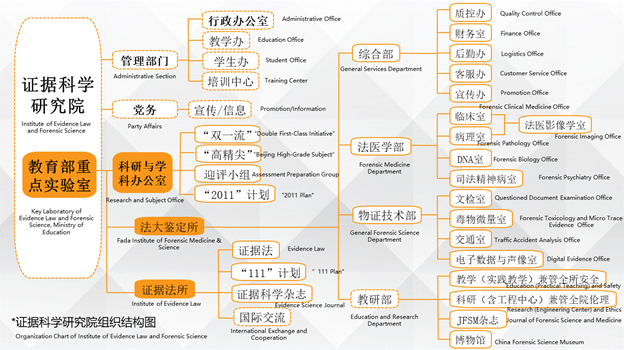
Innovation Teams
By the August 2019, the Institute has a staff of sixty(60) members, including thirty-four (34) full-time faculty members (with eleven professors and eighteen associate professors), ten (10) doctoral supervisors (including three off-campus part-time tutors), thirty-eight (38) master's supervisors (including twelve off-campus part-time tutors).
In the early stage of the establishment, the Institute built five innovation teams in order to promote the development of forensic science technologies and evidence law, which are
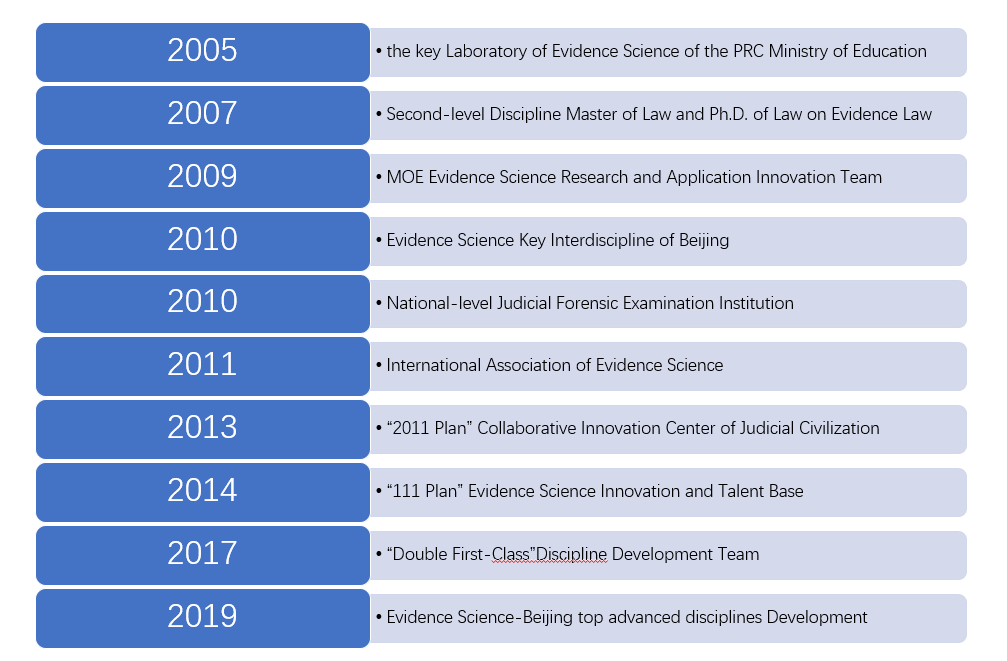
teams of evidence law, forensic medicine, physical evidence technology, judicial psychology and evidence rules. In 2009, the innovation team of evidence science research and application led by Professor Jinxi Wang which was reintegrated and constructed upon the aforesaid five innovation teams, was successfully selected into "the Yangtze River Scholar and Innovation Team Development Plan of 2009" of the PRC Ministry of Education. Since the Year of 2011, the Institute has established an innovation team of evidence law research and application and an innovation team of forensic science research and application under the "2011 Plan" China Collaborative Innovation Center of Judicial Civilization. In the meantime, the Institute also built up three CUPL young scholar innovation teams.
Step by step, the aforementioned innovation teams have gradually grown up into a discipline-structure complementary, innovative academic group. Its main research fields include: foundational theories of evidence law, comparative studies on evidence law, research on people's court evidence rules, studies on China Justice Index, Sino-Swiss collaborative studies on physical evidence technology, China-U.S. collaborative research on forensic pathology, studies on key techniques in forensic clinical medicine, studies on technical appraisal of medical damages, studies on theories and application of health law, studies on the forensic science culture, research on psychiatry and law, studies on the fundamental issues of the judicial forensic examination system, studies on scientific evidence and research on new technologies of forensic science.
Scientific Research
Identify the Authenticity of Evidence; Cast the Cornerstone of Rule of Law.
– Professor Ping Jiang
![]()
In the past ten years, the IELFS has undertaken one hundred and three (103) Ministry-level and above Research Projects, including twelve (12) national and MOE Humanities and Social Science Major Projects and eighteen (18) National Natural Science Fund projects, received six (6) state or national level awards for scientific achievements, and undertaken two hundred and sixteen (216) research projects of all sorts, with a total research funding of RMB ¥49,143,000.
Since 2008, eighty (80) research projects of the IELFS have been approved as the MOE Key Laboratory Open Projects, with a total approved research funding of RMB ¥3,315,000 (six approved projects in 2008, eleven in 2009, nine in 2010, seven in 2011, nine in 2012,nine in 2014, seven in 2016, seven in 2017, eight in 2018 and seven in 2019).
Published Monographs and Books |
Published Academic Papers |
Invention Patents |
Utility Model Patents |
National Public Safety Industrial Standards |
121 |
768 |
4 |
13 |
4 |
Interdisciplinary Study
The Institute of Evidence Law and Forensic Science in China University of Political Science and Law is the only academic institution in the world that combines a research team of evidence law and a research team of forensic science, conducting interdisciplinary studies on evidence science.
– Professor Ronald J. Allen
[International Courses]
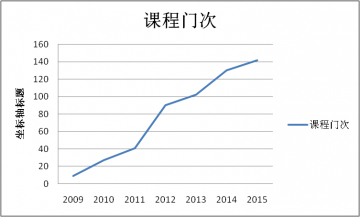 The Institute has established master degree and doctoral degree programs (Master of Law and Ph.D. of Law) on evidence law with three research areas: evidence law, forensic medicine and physical evidence technology. The Institute also has a juris master program (J.M.) with two research areas: forensic science and judicial civilization. The Institute also has a part-time juris master degree program (part-time J.M.) in study of evidence science. In the year of 2010, the Academic Committee of Beijing Municipal Education Commission formally approved the "evidence science" discipline of CUPL as the key inter-discipline of Beijing.In 2019, as the first batch, Evidence Science was selected into the development list of top advanced disciplines in Beijing universities.
The Institute has established master degree and doctoral degree programs (Master of Law and Ph.D. of Law) on evidence law with three research areas: evidence law, forensic medicine and physical evidence technology. The Institute also has a juris master program (J.M.) with two research areas: forensic science and judicial civilization. The Institute also has a part-time juris master degree program (part-time J.M.) in study of evidence science. In the year of 2010, the Academic Committee of Beijing Municipal Education Commission formally approved the "evidence science" discipline of CUPL as the key inter-discipline of Beijing.In 2019, as the first batch, Evidence Science was selected into the development list of top advanced disciplines in Beijing universities.
The Institute has independently recruited students since 2009. The Institute has so far offered six hundred and fifty two(652) courses, among which thirty(30) courses were given by foreign adjunct professors.
The Institute provides featured international courses to students. Every year the institute invites world well-known scholars from the United States, Switzerland, Italy and Australia, domestic distinguished scholars, and judges from the United Nations International Tribunal to share their knowledge and experience about international classic evidence law, forensic science and related interdisciplinary knowledge, and international frontier issues with the CUPL students. The Institute has offered fourteen (14) courses, which are given in English with English reading materials.
No. |
Name |
Country/University |
Courses |
||
1 |
Christophe Champod |
Lausanne University, Swiss |
Analysis of Evidence |
||
2 |
Ronald Allen |
Northwestern University, US |
U.S. Evidence Law |
||
3 |
李昌钰(Henry C. Lee) |
New Haven University, US |
Criminal Examination |
||
4 |
Geneviève Massonnet |
Lausanne University, Swiss |
Micro-Physical Evidence Evaluation |
||
5 |
Williams David Mazzella |
Lausanne University, Swiss |
Documentary Examination |
||
6 |
李 玲 (Ling Li) |
Maryland University, US |
Forensic Pathology |
||
7 |
Paul Roberts |
Nottingham University, UK |
Criminal Evidence and Human Rights |
||
English Criminal Evidence In Comparative Perspective |
|||||
8 |
Edward Imwinkelried |
UC Davis University |
Scientific Evidence |
||
9 |
Michele Taruffo |
University of Pavia |
Evidence Law and Proof from a Comparative Perspective |
||
10 |
Andrew Ligertwood/David Caruso |
Adelaide University |
Common Law Criminal Process and Forensic Science Evidence |
||
| 11 | Joseph L. Hoffmann | Indiana University – Bloomington | Evidence in U.S. Criminal Cases | ||
| 12 | Aviva Orenstein | Indiana University – Bloomington | Overview of American Evidence Law and the American Trial | ||
| 13 | Franco Taroni | University of Lausanne, Switzerland | Probabilistic Inference and Scientific Evidence Evaluation | ||
| 14 | Michael Greco | Former President of American Bar Association (ABA) | International Criminal Law | ||
| 15 | 满运龙 (Thomas Yunlong Man) | Peking University | Legal Profession and Practices | ||
| 16 | Liu Daqun | Vice-President of International Criminal Tribunal for the Former Yugoslavia (ICTY) | International Criminal Law | ||
Student Cultivation
Top legal professionals need three types of knowledge: knowledge of law, knowledge of policy and knowledge of evidence science. Nowadays, what China legal education lacks the most is knowledge of evidence science.
– Professor Wenxian Zhang
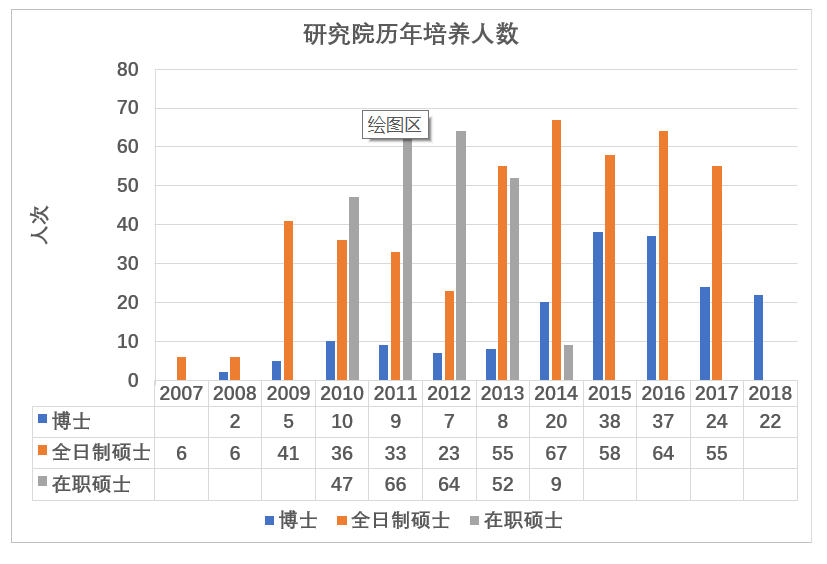
The Institute has produced in the full-time program ninety-four (94) doctoral graduates, three hundred and twenty-five (325) masters graduates, ten (10) postdoctoral researchers, and in the part-time program two hundred and thirty-eight (238) masters graduates. The Institute has held seven (7) Annual Spring Forum and Annual Fall Forum on evidence science, a total of one hundred (100) lectures. The Institute has also held four (4) Annual Capital University Doctoral Forum on Evidence Science. In 2012, the Institute held the National University Doctoral Forum on Evidence Science.
The Institute has held six (6) Annual Evidence Law Workshop Series. The Institute has so far invited thirty-two (32) world-class scholars and experts from the U.S., U.K., Australia, Italy, Switzerland, and New Zealand and also from other parts of the nation to give lectures. A total of four hundred (400) university faculties and judges have attended the Evidence Law Workshop Series.
Entrusted by the "2011 Plan" CICJC "Five Missions Training" program, the Institute hosts training program and has so far trained a total of six thousand eight hundred and thirty-six (6836) policemen via the "Research on Evidence Law and Its Innovative Application" program, and a total of four thousand and twenty-three (4023) judicial forensic experts via the "Research on Forensic Science and Its Innovative Application" program.
Featured courses offered by IELFS:
Areas of Study |
Courses |
Credit Hour |
Evidence Law |
Theory and Methods of Legal Reasoning |
36 |
Foreign Evidence Study |
54 |
|
Evidence Law Legal English |
36 |
|
Forensic Science Seminar |
54 |
|
Evidence Law Case Study |
36 |
|
China Contemporary Evidence Rule of Law |
36 |
|
Forensic Science |
History of Forensic Science |
18 |
Forensic Science Professional English |
36 |
|
Scientific Evidence |
18 |
|
Introduction of Forensic Science |
54 |
|
Laboratory Accreditation and Quality Control |
18 |
|
Forensic Science Clinic |
46 on average |
|
Judicial Civilization |
History of Chinese Judicial Civilization |
36 |
Judicial Sociology |
36 |
|
Judicial Professional Ethics |
36 |
|
Judicial Civilization |
36 |
|
Modern Judicial Ideas |
36 |
|
Theory and Methods of Judicial Reasoning |
36 |
|
Evidence Evaluation |
36 |
|
Theory and Practice of Judicial System in China |
36 |
|
Theory and Practice of Environmental Justice |
36 |
|
Intellectual Property Litigation and Evidence |
36 |
Forensic Science
Science is the professional soul of forensic scientists, while justice is their professional life.
– Professor Lin Chang
Fada Institute of Forensic Medicine & Science ("FdFS") was founded in 1986. The principle that governs FdFS' performance of judicial forensic testing is "scientific performance of forensic testing and serving for justice". FdFS is one of the few national-level forensic examination institutions.
FdFS now has three office locations, headquarters office, west end office, and a forensic pathology autopsy center (in total of 6600 square meters). It has sixty-five (65) staff members (87% are senior forensic experts), a total of eighty (80) sets of equipment, the investment on which reaches an amount of about RMB¥35,000,000. FdFS also owns a library that provides collections particular rich in forensic science. The book collection at the institute library is over 8,000 volumes, including more than eighty (80) kinds of Chinese periodicals and more than ten (10) types of foreign language periodicals.
In April 2008, FdFS passed the qualification evaluation test held by China National Accreditation Service for Conformity Assessment 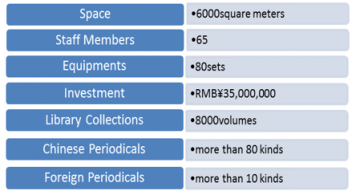 and the Certification and Accreditation Administration of the People's Republic of China. FdFS is the first university-based judicial forensic examination institute that passes the national qualification evaluation test by CNAS and gets approved of the national level forensic testing qualification.
and the Certification and Accreditation Administration of the People's Republic of China. FdFS is the first university-based judicial forensic examination institute that passes the national qualification evaluation test by CNAS and gets approved of the national level forensic testing qualification.
FdFS can carry out various types of evidence examinations, including forensic clinical pathology, forensic pathology, forensic biology, forensic psychology, forensic toxicology, questioned documentations, trace evidence, audiovisual materials evidence, digital evidence. FdFS has taken examination cases from all around the country. In the past decade, it has provided forensic examinations to a total of nearly 50,000 cases to assist all levels of the judiciary bodies, the arbitration institutions and the executive authorities resolving conflicts and disputes.
FdFS founded the China Forensic Science Museum (CFSM), which is the first museum featuring forensic science in China. FdFS is a comprehensive academic and research institute, which provides literature and cultural relics collections (particularly relating to forensic pathology and forensic technology), promotes propaganda and education and conducts scientific research. FdFS has held twice of "Ding Yong" Excellent Forensic Reports Competition. The goal of holding the competition is to improve the quality of forensic reports and to formalize the forensic reports writing. It has also published "Collection of Excellent Forensic Reports".
International Cooperation
Institute of Evidence Law and Forensic Science of CUPL plays a leading role in international scientific research on evidence science.
– Professor Ronald J. Allen
The Institute's Evidence Science Innovation and Talent Base ("ESITB") was approved and enrolled in the "111 Plan – Innovation and Talent Recruitment Plan for Disciplines in Top Universities" in 2014. Among the universities that have been accredited by "111 Plan", ESITB is the only one focusing on legal studies. Up to now, ESITB has thirty-five (35) researchers, including ten (10) oversea research fellows all of whom are world-wide renowned professors and senior researchers, twenty-six (26) domestic research fellows among whom are ten (10) professors, one (1) postdoctoral fellow, and fifteen (15) are doctoral candidates.
The Institute held the 1st International Conference on Evidence Law and Forensic Science ("ICELFS") in Beijing in September 2007, the 2nd ICELFS in September 2009, the 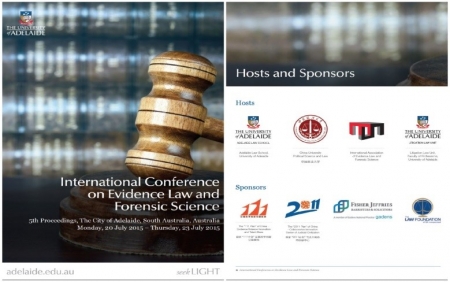 3rd ICELFS in July 2011, and the 4th ICELFS in July 2013. During the 3rd ICELFS, the International Association of Evidence Science was founded. Its secretariat is located at the Institute of Evidence Law and Forensic Science of CUPL. In 2015, the Institute co-hosted the 5th ICELFS together with University of Adelaide Law School in Adelaide, Australia, which set the first step bringing ICELFS abroad. The Institute will continue taking ICELFS to North America, Europe, Africa and so forth. To promote a common understanding of evidence law, the Institute, with an open attitude, is introducing China’s evidence science to the world.
3rd ICELFS in July 2011, and the 4th ICELFS in July 2013. During the 3rd ICELFS, the International Association of Evidence Science was founded. Its secretariat is located at the Institute of Evidence Law and Forensic Science of CUPL. In 2015, the Institute co-hosted the 5th ICELFS together with University of Adelaide Law School in Adelaide, Australia, which set the first step bringing ICELFS abroad. The Institute will continue taking ICELFS to North America, Europe, Africa and so forth. To promote a common understanding of evidence law, the Institute, with an open attitude, is introducing China’s evidence science to the world.
Up until 2016, the Institute has held five times of ICELFS. ICELFS has become an academic brand representing China University of Political Science and Law in participating the international academic exchange activities. ICELFS has also become an important platform for experts and scholars who are specialized in evidence law and forensic science to develop effective interdisciplinary communications. The successful holding of ICELFS marks that the research on evidence science has entered into a new chapter.
Ten Overseas Joint Research Bases:
1. Hague Liaison Office, Collaborative Innovation Center of Judicial Civilization (Hague UN ICTY, Netherland);
2. Sino Swiss Evidence Science Research Center (University of Lausanne, Switzerland);
3. China-U.S. Forensic Evidence Research Center (Office of the Chief Medical Examiner – State of Maryland & University of Maryland, U.S.);
4. Academy for the Study of Chinese Law and Comparative Judicial Systems (Indiana University-Bloomington, U.S.);
5. Китайско-российский исследовательский центр сравнительной юстиции (China-Russia Comparative Judicial Research Center, Russian Academy of Justice, Russia);
6. China-Australia Research Partnership for Judicial Civilisation (The University of Adelaide, Australia);
7. Academy of Comparative Studies on SINO-U.S. Evidence Law (University of California Davis, U.S.);
8. China-U.S. Forensic Technology Research Center (University of New Haven, U.S.);
9. Korea National Forensic Service (Seoul, Korea);
10. Center for Chinese Legal Studies (Max Planck Institute for Foreign and International Criminal Law, Germany).
